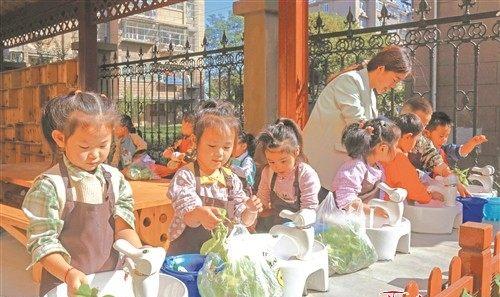
Children participate in the "Help the Cook" activity.
◎ Text/Xu Bao Rong Media reporter Li Xiaowei
Photo / Xu Bao Rong Media reporter Qin Yuan
"See my cucumbers washed clean?" "Teacher, the cucumber's body is covered with small spikes." ...... The Xiaoxiang Kindergarten in Yunlong District is filled with the childish voices of children, and the children in the middle class are "helping the kitchen".
Such a scene is just a microcosm of Xiaoxiang Kindergarten's one-day life. Since its opening in April this year, the kindergarten has firmly established the awareness of "life is education", effectively integrated internal and external resources, and used the educational factors contained in life itself to make children become modern small citizens who can play, explore and enjoy life in one day.
Before the "help the kitchen" activity, the reporter saw that the teacher organized the children to know the cucumber and understand the nutrition in the cucumber, which is a very delicious food, and the children's love for cucumbers is one more point. Then the teacher brought a large pot of cucumbers, and the children excitedly surrounded it: "Wow! A lot of cucumbers, I want to wash them well. "Let's compare who washes more and washes them clean!" The children joined the kitchen.
In the midst of laughter, in a few moments a large basin of cucumbers was washed clean. The teacher and the children brought the washed cucumbers to the chef in the kitchen. Looking at these capable children, the kitchen staff gave a thumbs up and kept praising: "These little kitchens are so powerful!" ”
"When I get home, I also want to help my parents choose dishes"... Children are overjoyed to see the fruits of their labor turned into a delicacy. Gao Chunlan, the class teacher of Middle (1), said that the children experienced the hard work of the chefs, felt the joy of labor, and cultivated their beautiful feelings and good qualities of loving labor, respecting laborers and cherishing the fruits of labor.
In the vegetable field of the kindergarten labor practice base, the children in the kindergarten pull out the small green vegetables and put them into their own bags. "The little greens are to be given to the grandparents in the community, and they are gifts to the grandparents." Qiao Xinyang, a child in the eldest (1st) class, said. "In the activity, the children not only walked into nature and felt the beauty of autumn, but also cultivated the children's love of labor, and also let the children feel the joy of sharing in the process of experiencing mutual help and mutual assistance." Teacher Wang Jinqiao, the head teacher of the big (1) class, told reporters.
"All courses are life, all life is courses." The theory of "life is education, a day of life is a curriculum" put forward by educator Tao Xingzhi has blossomed everywhere in Xiaoxiang Kindergarten. Since the opening of the kindergarten in April this year, the kindergarten has begun to explore the "curriculum life", and children's drinks and food, flowers and grass around them can be included in the curriculum. From the perspective of children, the daily life of young children, social life and games related to young children are used as curriculum resources, so that children can develop harmoniously physically and mentally.
Chen Chunsheng, director of Xiaoxiang Kindergarten in Yunlong District, said that one of the most important features of the kindergarten education stage that is different from other school sections is the curriculum of one-day life. From entering the kindergarten in the morning to start the morning inspection, to making plans, carrying out regional activities and group activities, to toileting, washing hands, eating, napping, all of these links are important lessons that children can learn and promote their own development in the kindergarten. For example, children are the first to sign in after entering the class, and children of different ages sign in different ways, reflecting the difference in age levels. Checking in gives kindergarten life a sense of ceremony, helps children gradually establish a concept of time, and strengthens children's sense of responsibility. After checking in, the children will take turns on duty every day according to the jointly discussed duty plan: counting the children's attendance, watering the flowers and plants, feeding the small animals, changing the water, and preparing and sorting out before and after the meal. Children who are not on duty can make observation records, plan one-day activities, or directly select districts to carry out regional play activities according to their own wishes. In this process, the role of the teacher has changed, that is, to be good at observing and discovering children's learning, accurately analyzing the development level of young children, and providing support strategies with "environmental materials + one-day activities + teacher-child interaction" to help children actively accumulate life experience and promote children's experience and learning.
In the interview, the reporter saw that in order to make the environment play the significance of education, the environmental arrangement of the kindergarten is also full of real and natural decorations. According to the regional characteristics of the kindergarten and the age characteristics of the children, the teachers used the waste items in life, and combined with the real scenes in life, created an educational theme wall, baking room, art room, book corner, science and technology activity room, etc., to support the children's exploration and operation.
Source: Xuzhou Net, China
Statement: This article has indicated the source of the reprint, if there is any infringement, please contact us to delete! Contact email: [email protected]